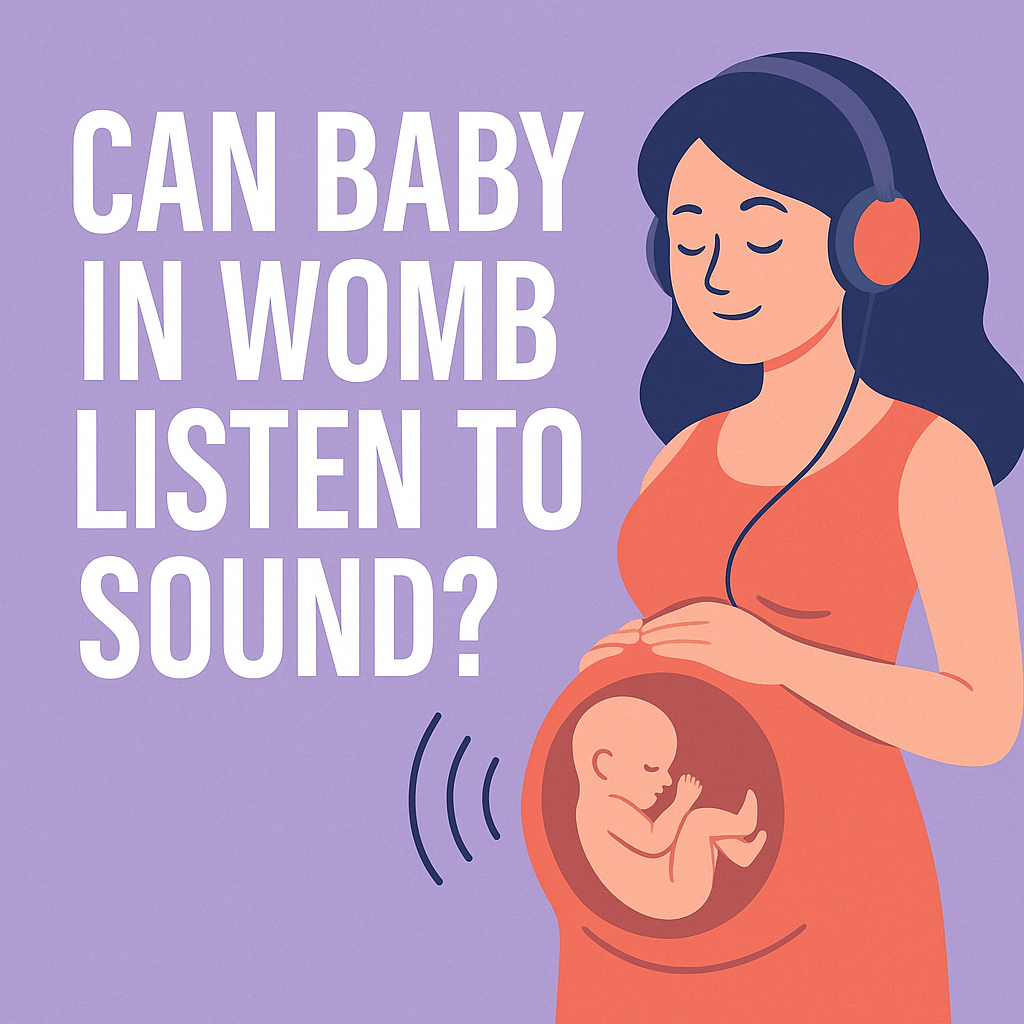Can a baby hear music, sound or voices in the womb? Discover how sounds affect fetal brain development and why prenatal music and voice exposure matter for emotional bonding and cognitive growth.
Introduction
Have you ever wondered whether your baby can hear you while still in the womb? Science says yes! Around the 18th week of pregnancy, a fetus begins to detect sound. By week 25–27, this tiny being can respond to external noises—especially voices and music.
In this blog, we’ll explore:
- When and how a baby starts hearing in the womb
- The impact of different sounds, including music, voices, and noise pollution
- Scientific studies backing sound exposure during pregnancy
- Tips for playing music for your unborn child
📆 When Does a Baby Start Hearing in the Womb?
Hearing develops in stages:
- Week 18: Baby can detect vibrations and faint sounds.
- Week 25–28: Baby begins to recognize voices and rhythms.
- Week 30+: Baby responds to sound changes with movement or heartbeat shifts.
🎶 What Sounds Can a Baby Hear Inside the Womb?
Your womb isn’t silent—it’s full of sounds! The baby can hear:
- Your heartbeat and digestive noises
- Your voice (especially when you speak or sing)
- External sounds like music, loud noise, or environmental sounds
Fun Fact: High-pitched sounds travel more easily into the womb. That’s why babies often recognize a mother’s voice more than anyone else’s.
🎧 Benefits of Sound Exposure in the Womb
1. Emotional Bonding
Talking, reading, or singing to your baby can build a deep emotional connection even before birth.
2. Language Development
Early exposure to language helps babies recognize their native language and develop early cognitive skills.
3. Brain Stimulation
Gentle music can stimulate the baby’s developing brain, potentially boosting memory and attention span later in life.
4. Relaxation and Sleep
Lullabies or soft classical music can calm both the mother and the baby, helping reduce stress.
⚠️ Harmful Effects of Loud Noises on the Baby
Not all sounds are good for the baby. Constant exposure to loud noise (above 85 dB) may:
- Cause stress for the fetus
- Interrupt normal sleep cycles
- Potentially affect hearing development
Avoid loud concerts, construction sites, or using headphones on your belly with high volume.
🎵 Best Types of Sounds to Play for Babies in the Womb
Here are safe and soothing sound options:
- Classical music (Mozart effect)
- Lullabies or nature sounds
- Calm instrumental or soft Indian ragas
- Parent’s voice recordings or reading stories
💡 Pro Tip: Use a speaker at low volume outside the belly and limit sessions to 10–20 minutes.
🧪 What Does Science Say?
- A study in Nature (2013) found babies exposed to music in the womb had stronger brain responses.
- Another research from PNAS showed newborns remembered sounds they heard in utero weeks after birth.
👩⚕️ Tips for Parents
- Start talking and singing from the 5th month of pregnancy.
- Play calming, rhythm-based music.
- Avoid loud, sharp noises near the belly.
- Create a peaceful sound environment at home.
Can a baby really hear in the womb?
Yes, by the second trimester, babies begin to hear and respond to sounds.
What kind of music is best during pregnancy?
Soothing, instrumental, or classical music is best. Avoid loud or fast-paced music.
Can loud sounds harm my baby during pregnancy?
Yes. Prolonged exposure to loud noise can stress or even harm fetal development.
Is talking to the baby in the womb beneficial?
Absolutely. It promotes bonding and supports early brain development.
Can music help my baby sleep better after birth?
Babies often recognize and are calmed by familiar womb-time sounds after birth.

